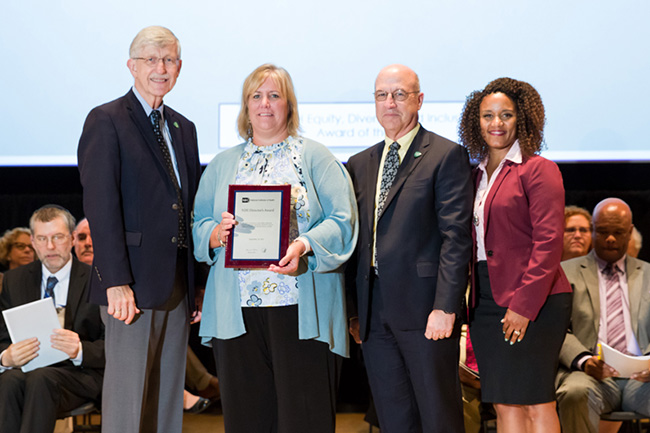
Change Agents are cultivators who plant seeds in our lives. Their presence nurtures and molds us every day, giving shape to the environment in which we work. They are fueled by their own passion to contribute and thus incite passion in others. They are the risk takers and the visionaries who see possibilities when others see obstacles.
Tricia Coffey, Chief of Hospital Information Management in the Clinical Center (CC) at the National Institutes of Health (NIH) is a change agent for the Sexual and Gender Minority (SGM) community by creating a more inclusive and diverse patient experience, both clinical and non-clinical staff training, and supporting and reaching out to other organizations related to gender.
How is this change agent addressing issues in the SGM community?
Tricia Coffey did extensive work on the creation of non-gender conforming demographics in the Clinical Research Information System. She has also been an incredible ally to those of the Lesbian, Gay, Bisexual, Transgender, Intersex (LGBTI) community by creating a more inclusive environment. Coffey also supported gender identity research through an electronic medical record that incorporates gender identity information as well as clinical and non-clinical staff training.
What is this change agent doing to show leadership in diversity and inclusion of the SGM community?
Tricia Coffey works in consort with the Clinical Information Management Subcommittee, the NIH SGM Research Coordinating Committee (RCC), NIH Sexual and Gender Minority Research Office (SGMRO), and the Fenway Institute to include gender identity in patients electronic medical record to achieve care with respect and the spirit of inclusiveness which leads to better health outcomes for SGM persons as well as enhances a diverse patient population in clinical research trials. The Office of Disease Prevention and Health Promotion (ODPHP), the “Healthy People 2020,” the national objective to improve health for Americans with attention to addressing health disparities, includes LGBT persons. A barrier to accessing and receiving appropriate care for SGM may be a stigma or lack of knowledge by staff associated with gender identity, leading to greater health disparities among SGM. Addressing gender identity was merely one component of improving the SGM experience and health outcomes, staff training was also essential for appropriately understanding SGM experience and respect. Additionally, Coffey presented on the topic of “Gender Identity at NIH” to the American Health Information Management Association convention. And very appropriately, the theme for the convention was “Inspiring Leadership, Influencing Change,” which allowed Coffey to reach beyond NIH to change agents at other medical facilities nationwide.
Tricia Coffey is a 2019 Sexual & Gender Minority (SGM) Community and Ally Leader Awardee.
"Sexual and gender minority" (SGM) is an umbrella term* that encompasses lesbian, gay, bisexual, and transgender populations as well as those whose sexual orientation, gender identity, and expressions, or reproductive development varies from traditional, societal, cultural, or physiological norms. This includes Disorders or Differences of Sex Development (DSD), sometimes known as intersex.
To further celebrate Pride Month at NIH, we are honoring individuals who help to advance SGM research or help to make NIH a more welcoming environment for individuals in SGM communities.
Do you have a story idea for us? Do you want to submit a guest blog? If it's about equity, diversity, or inclusion, please submit to edi.stories@nih.gov.
For news, updates, and videos, follow or subscribe to EDI on: Twitter, Instagram, Blog, YouTube.







